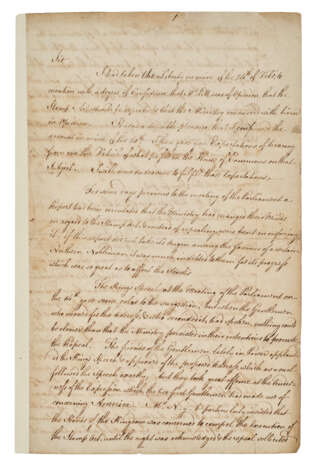ID 1119121
Lot 101 | His remarks opposing the Stamp Act
Valeur estimée
$ 7 000 – 10 000
William Pitt, 14 January 1766
STAMP ACT CRISIS – PITT, William, 1st Earl of Chatam (1708-1778). Manuscript in an unknown hand transcribing a large part of Pitt's remarks opposing the Stamp Act, [London, 14 January 1766).
16 pages, 320 x 210mm (binding strips affixed to left margins, occassional spots of browning, final leaf repaired with marginal losses infilled). Two leaves framed with portrait with the remainder housed in a compartment in the rear of the frame.
"…this Kingdom has no Right to lay a Tax on the Colonies…." A remarkable contemporary transcript a letter detailing William Pitt's celebrated speech in the House of Commons urging repeal of the Stamp Act, written specifically to send to an American correspondent. The authorship of the original letter is unknown, but it was written by someone who was in the House of Commons on 14 January 1766 when Pitt delivered his unwritten remarks on the Stamp Act and taxation of the American colonies in general. The author managed to capture the majority of the speech, in which Pitt urged that "…the Stamp Act be repealed absolutely, totally, and immediately; that the reason for the repeal should be assigned, because it was founded on an erroneous principle. At the same time, let the sovereign authority of this country over the colonies be asserted in as strong terms as can be devised, and be made to extend every point of legislation whatsoever: that we may bind their trade, confine their manufactures, and exercise every power whatsoever — except that of taking money out of their pockets without their consent." Pitt's distinction conformed with many of the arguments proffered by the Stamp Act Congress, but the government resisted making this distinction. When Parliament finally repealed the Stamp Act, it was not repealed on this basis, but rather because of the political and economic ramifications of a continuation of the impasse between Great Britain and her colonies. Following the Stamp Act's repeal in February 1766, Parliament passed the Declaratory Act in March which stated that Parliament retained the authority to pass legislation that would be binding on the colonies—confirming the assertion that the colonies were represented "virtually" in London—another point that Pitt disputed in his 14 January remarks. The majority of the present transcript appeared in American newspapers beginning with the Pennsylvania Gazette and Pennsylvania Journal of 24 April 1766, followed by the New-York Mercury on 28 April. However, it is certain that this transcript was not derived from a published source as it includes an introductory paragraph not reproduced in print: "Sir, I have taken the Liberty in mine of the 24th of Decr; to mention with a degree of Confidence that Mr. Pitt was of Opinion that the Stamp Act should be repealed & that the Ministry concurred with him in Opinion. It was a sensible pleasure that I confirmed the account in mine of the 20th. I then gave you Expectations of hearing from me the Detail of what passed in the House of Commons on that Subject. I will now endeavour to fulfill those Expectations." However, the writer omits the final three paragraphs that appeared in the newspapers, namely remarks made by others once Pitt concluded his own. While we can conclude that this manuscript was likely copied from the original letter, the purpose of the copy remains unclear. It may have been intended as a duplicate to be sent by a separate ship—a common practice to ensure the delivery of mail overseas.
| Artiste: | William Pitt I (1708 - 1778) |
|---|---|
| Lieu d'origine: | Europe du Nord, Europe, Royaume-Uni |
| Catégorie maison de vente aux enchères: | Lettres, documents et manuscrits |
| Artiste: | William Pitt I (1708 - 1778) |
|---|---|
| Lieu d'origine: | Europe du Nord, Europe, Royaume-Uni |
| Catégorie maison de vente aux enchères: | Lettres, documents et manuscrits |
| Adresse de l'enchère |
CHRISTIE'S 20 Rockefeller Plaza 10020 New York Etats-Unis | ||||||||||||||
|---|---|---|---|---|---|---|---|---|---|---|---|---|---|---|---|
| Aperçu |
| ||||||||||||||
| Téléphone | +1 212 636 2000 | ||||||||||||||
| Fax | +1 212 636 4930 | ||||||||||||||
| Conditions d'utilisation | Conditions d'utilisation | ||||||||||||||
| transport |
Service postal Service de messagerie ramassage par vous-même | ||||||||||||||
| Modes de paiement |
Virement bancaire | ||||||||||||||
| Heures d'ouverture | Heures d'ouverture
|



